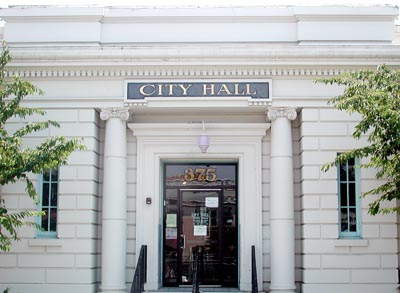City Manager Clint Quilter said officials recently have changed
various city codes and this one came up during that examination. He
contended that in the past, provoking people to testify in front of
the city on issues such as code enforcement problems had been a
deterrent.
HOLLISTER
City council members this week approved an ordinance that allows officials to subpoena witnesses and records for administrative, code enforcement and personnel hearings held by Hollister boards.
City Manager Clint Quilter said officials recently have changed various city codes and this one came up during that examination. He added that in the past, provoking people to testify in front of the city on issues such as code enforcement problems had been a deterrent.
Code enforcement, he said, is the main focus of the ordinance. He gave the example of an abandoned lot and said the council now could subpoena witnesses to come in and testify as to why it had become that way.
Asked why the ordinance came up, City Attorney Stephanie Atigh had this to say: “Because we don’t have an ordinance like this and we need one.”
The official ordinance says the following: “The City Council, or its designee, may issue a subpoena pursuant to Section 37104, et seq. of the California Government Code requiring attendance of witnesses or production of books or other documents for evidence or testimony in any action or proceeding pending before it, so long as it serves any valid purpose within the jurisdiction of the City Council.”
Hollister is a general law city, which means its power to govern comes from the state Legislature. Other cities, such as Gilroy and Watsonville, are charter cities, meaning their power to subpoena already is granted from the state Constitution.
Although Watsonville hasn’t had to use its power to subpoena during his tenure, City Attorney Al Smith had positive things to say about its potential.
“Its not an awful thing – we want to hear the truth,” he said.
Smith said there are two potential uses for the power to subpoena. One is the transient occupancy tax, which taxes hotels for usage of their rooms. The other is code enforcement. Smith gave the example of someone turning a garage into a residence, and if they were using a forced air heater, it could cause exfixiation of the resident. The city would now have the ability to subpoena the property owner to testify about the situation. This way, the police do not need to become involved and the city can assess fines for the situation to be remedied.
The approval also repeals a prior law that established a three-person administrative hearing board, according to a staff report from the city. In 2006, the city had amended the code authorizing a single hearing officer to hear administrative hearings.
This ordinance will go into effect on Dec. 31, 30 days after its passage.










